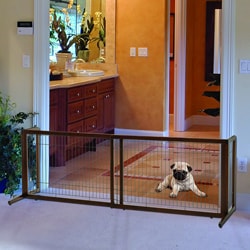If you?ll remember, I asked for a pet gate this Christmas.

Carlson Extra-tall Walk Through Pet Gate
Well, I?m happy to report that ?Santa? came through, and I?m eagerly awaiting our move so we can put it up and try it out.
As you may have read before, it took a while for us to pick out a pet gate, since it needed to accommodate a number of specific requirements. So time will tell if this gate can really pass the test. (Don?t worry, I?ll keep you all posted!)
That said, there are dozens of pet gates available for purchase, and they all offer different features. I wanted to share some of those specifics with you, in case you too are looking for the perfect pet gate.
Material
Material can play a major role in durability, cost and more. Most gates that I?ve found come in one of three materials:
- Wood (these come in a variety of finishes)
- Metal (these come in a variety of finishes, too)
- Plastic
While no one material is superior over another, they do each have their own pros and cons. For example, as nice as wood may look, a young puppy may chew on it or your cat may scratch on it. Similarly, a nice wooden gate may look more attractive in your home than a plastic one, and so on.
Mounting

Detail of the pet gate above
This is probably one of the most important variables you?ll want to consider. How a gate mounts can impact where it?s located, how easily you can move it, how secure it will be and more.
- Wall-mount: Many heavier/more intense gates are wall-mounted. This means that some part of the gate will be screwed into your wall, which will make it more secure. Gates that are wall-mounted will likely be in that location for a while, as you can?t move them easily.
- Pressure-mount: Pressure-mount gates are the ones that do not screw into the wall; instead you manually adjust the tension to hold it in place. If not done properly, these can be knocked out of place. Some pressure-mount gates also come with a wall-mounting option.
*If you?re considering placing a pet gate in a doorway that has a baseboard, look for a gate that features an independent tension system. This means you can adjust the top tension to one width, and the bottom tension to another width.
- Free-standing: These gates can go just about anywhere, since they stand on their own. Some may have their own feet to hold them up, others may be modular, consisting of several sections, so you can shape them as needed.
Height

Richell Freestanding Pet Barrier
Thankfully, gates come in a variety of heights to meet all of our needs: from the low gates that are perfect for small, non-jumping pets to extra-tall gates.
Most that are tall enough feature walk-through doors for humans. Extra-tall gates are ideal for larger pets/children and pets that are capable of jumping over lower gates. (http://bit.ly/Uh8ssc)
Width
Keep in mind that some pet gates only extend to a specific width. To accommodate larger door openings, some come with extensions you can add on the ends. Others require you to purchase these separately.
Some gates come in extra-wide widths for larger openings.
Barrier Design
- Diamond/square/hexagon: These patterns are popular on less-expensive pressure-mounted gates. However, as I found out with CG, they may also be easily climbed by a smaller, agile pet.
- Bars: Bars can be a great solution for pets who have a tendency of climbing pet gates. That said, make sure you check the distance between each bar. Some of us have small pets who may be able to squeeze through them.
- Screen/fabric: Instead of featuring metal bars or crisscrossing wood, these gates feature a piece of material that blocks off one room from another. (http://bit.ly/Uhat7E)
Walk-through Door
These are ideal especially if your gate is too high for you to step over easily. This is its own topic since these doors can vary greatly from gate to gate. Read a product?s details to learn the specific features of your walk-through gate. In the meantime, here are a few things to keep in mind:
-

Carlson Extra-tall Walk Through Pet Gate
How the gate opens: Some require you to lift the door, others require you to press a button with your hand or foot. Carefully consider this to figure out what would be easiest for you, and which your pet can?t manipulate.
- Which way the door swings: This is especially important if your gate is located at the top of stairs. Some doors are made specifically for this, so it won?t open toward the stairs. This prevents anyone from accidentally falling through the door and down the stairs.
- If the door locks: Some doors feature other locking mechanisms that make it additionally difficult for anyone or anything to get through unintentionally.
While you?re thinking of all of those things, also consider how often you?ll walk through the gate, if you?ll be holding anything (may impact how many hands you?ll have free to open the gate), etc. Some gates even feature an automatic close.
Extra Features?
- Pet door: Perfect if you?re trying to keep a larger pet or child in one room, but want to give free rein to a cat or smaller pet. (http://bit.ly/Uh8ssc) Check the dimensions of the pet door to make sure it?s the right size for your smaller pets.
Have you purchased a pet gate? Which features were most important to you? Please share in the comments!
Like this:
Be the first to like this.
Source: http://lifewithchcats.com/2012/12/28/looking-for-a-pet-gate-youll-have-many-options/
Walking Dead Season 3 vampire diaries derek jeter Red Bull Stratos Redbull Stratos steve mcnair vice presidential debate
No comments:
Post a Comment
Note: Only a member of this blog may post a comment.